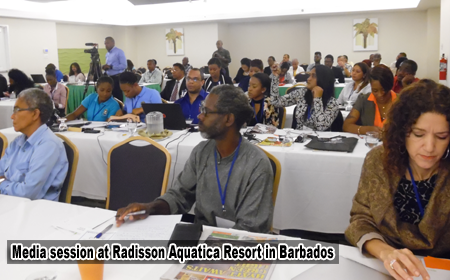BARBADOS, Wed. Feb. 24, 2016–“The basis of the rights of a journalist is based on freedom of expression which is the freedom of information – freedom of the press,” Andrew Smith, a lecturer at the University of Technology, Jamaica, this week told the approximately 68 media personnel who met in Barbados from 13 different CARICOM member states who were meeting for a two-day seminar. The seminar was hosted by Improved Access to Justice in the Caribbean (IMPACT Justice), and took place on February 23 and 24 at the Radisson Hotel in Barbados.
Where there are rights, there are also responsibilities, Smith said. Further, Smith said that the media plays an essential role to keep the public informed on current events that tend to be of public interest.
One of the things that we found to be common across the Caribbean that prevented the media from providing good information to the public was the lack of freedom of information, or in cases where there is a freedom of information law, it is a law without teeth.
Dale Elliott, Executive Producer for Documentary Untold Stories in St. Lucia, reiterated what Smith said when he told Amandala, “Journalism is accuracy, and without information a journalist runs the risk of being inaccurate. It is to inform you of the things that you should know on a daily basis; it is also to spread dialogue which is sometimes controversial and uncomfortable in nature, in the interest of collective society,” Elliott said.
Elliott added, “It [the media] is the voice to ask the difficult questions that most policy makers do not want to answer … the voice to uncover, to investigate and to deliver that information in a palatable way that a cross-section of society understands.”
But how can this be possible when there is no Freedom of Information Act that will uphold such practices, as Amandala was made to understand from Elliott, of St. Lucia.
While a Freedom of Information Act has been passed in Guyana, Nazima Raghubir, of Insight Magazine, told Amandala that such a legislation has not really benefitted journalists, since what you can ask for is “capped,” so there is a limit as to how much information they will give you, and deny you the rest “under privacy and national security concerns.”
Julius Gittens, independent media and communications specialist/journalist, another presenter who spoke on “Broadcast Journalism and Responsible Communication on Matters of Public Interest,” told Amandala that Freedom of Information is available in the Caribbean; however, “countries across the Caribbean are at different stages in the development of laws that give citizens access to government information.”
Gittens added that the law is supposed to ensure that the information is made available to you and there should be a mechanism in place that will provide for that process to take place.
“But then there are restrictions,” Gittens said, “where it is believed that the information requested is sensitive in nature and will threaten national security. As a result, the state will withhold that information from you based on those grounds. However, you can take your case to the court and allow the judge to decide whether that information should be released or not,” Gittens said.
Brenton Henry, the director of news for the Daily Observer Newspaper and the Observer Radio in Antigua & Barbuda, told Amandala, “Antigua & Barbuda is one of the few Caribbean countries where the Freedom of Information legislation has been passed.” As a result, “journalists can demand information that would normally be kept secret by a particular government agency and officials.”
Gittens said in his presentation that journalists should work hard to be fair as we strive to be fearless. He added that we, as journalists, have a duty to ensure that we do not cause or exacerbate harm.

